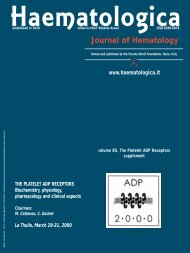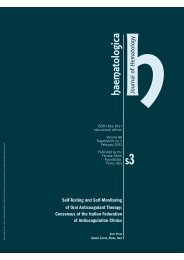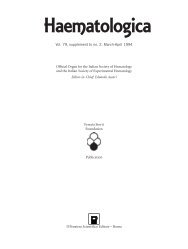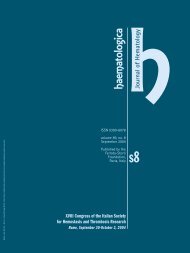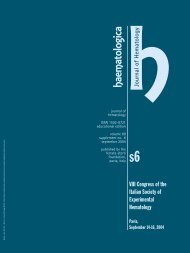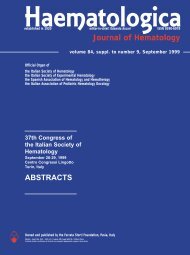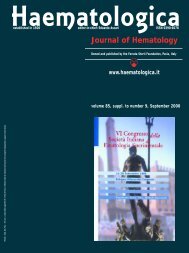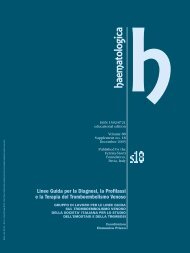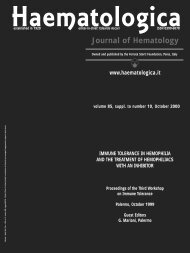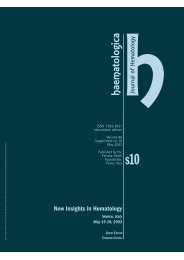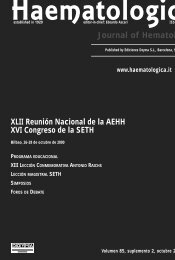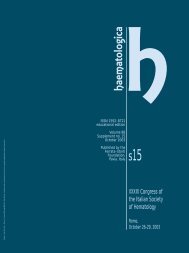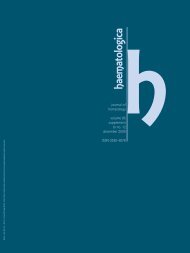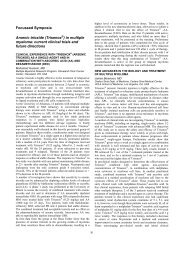2003; baxter - Supplements - Haematologica
2003; baxter - Supplements - Haematologica
2003; baxter - Supplements - Haematologica
- No tags were found...
You also want an ePaper? Increase the reach of your titles
YUMPU automatically turns print PDFs into web optimized ePapers that Google loves.
[Gene Therapy]review paperThe host immune response andrisk of inhibitor developmentfollowing adenoviral genetherapy for hemophiliahaematologica <strong>2003</strong>; 88(suppl. n. 12):111-114http://www.haematologica.org/free/immunotolerance2001.pdfDAVID LILLICRAPDepartment of Pathology, Richardson LaboratoryQueen’s University, Kingston, Ontario, CanadaBackground and current status ofhemophilia gene therapy trialsHemophilia remains a leading candidate diseasefor the successful application of somatic cellgene therapy. Indicative of this potential, thepast year has witnessed the completion of threephase I/II human clinical trials. Two of thesestudies have involved the delivery of a factor VIIItransgene by either the systemic administrationof a replication defective onco-retrovirus 1 or byex vivo delivery via electroporation to autologousfibroblasts. 2 The third study has involved deliveryof a factor IX transgene through intramuscularinjection of a recombinant serotype 2 Adeno-Associatedviral (AAV) vector. 3 None of thesestudies was associated with any adverse eventsand all three studies documented evidence ofintermittent, transient, low levels of expressionof the transgene product. No evidence ofinhibitor development has been seen in any ofthe twenty seven patients treated in these studies.Following the completion of these initialstudies, two new phase I/II trials have now beenstarted, the first involving hepatic delivery of afactor IX transgene by a serotype 2 AAV vectorand the second a gutless (minimal) adenovirusdelivering factor VIII. These two trials are still inthe very early stages of patient recruitment butboth trials have experienced temporary stoppagesdue to detection of vector in the semen of thefirst two patients in the AAV trial (no vectorfound in sperm) and transient thrombocytopeniain the first patient treated in the adenovirustrial.The objective of this report is to summarizeinformation pertaining to the nature of the hostimmune response associated with the use ofrecombinant adenoviral vectors for hemophiliaCorrespondence: David Lillicrap, Department of PathologyRichardson Laboratory, Queen’s University Kingston, OntarioCanada K7L 3N6. Phone: international +1.613.5481304.Fax: international +1.613.5481356E-mail: lillicrap@cliff.path.queensu.cagene therapy. This discussion also highlights thedifferences in the immune presentation of clottingproteins in the context of gene therapy comparedto routine protein infusion therapy (Figure1).Introduction to adenoviral gene therapyReplication incompetent adenoviruses havenow been used as gene therapy vectors for severalyears. They have a number of important advantagesfor this purpose, the most critical of whichare their ability to very efficiently transduce bothdividing and non-dividing host cells, their capacityfor packaging large transgene cassettes andfinally, the relative ease with which high titers ofthe vector can be produced. 4 All of these featurescontinue to make adenovirus an attractive candidatefor hemophilia gene therapy.However, a significant, ongoing concern associatedwith the delivery of adenoviral vectors isthe nature and magnitude of the host immuneresponse. 5-7 There is ample evidence to indicatethat this response involves early, innate reactivityfollowing within hours of vector delivery anda later, acquired, response involving both cellmediatedand humoral elements of the hostimmune system (Figure 2). The further discussionof these responses requires the separate considerationof so-called early generation vectors inwhich a limited number of early viral genes aredeleted from the vector (ie. E1+E2/E3/E4) andthe most recently generated helper-dependent or“gutless” vectors (also know as minimal or highcapacity vectors). 8,9The host innate immune response toadenoviral gene deliveryThe early, innate immune response to adenoviralgene delivery appears to be against componentsof the viral capsid. While adenovirus isan extremely efficient transducing agent formany different cell types, it is clear that viralentry is accompanied by significant cellular perturbation.Indeed, in preliminary studies of thepatterns of gene expression following adenoviralhaematologica vol. 88(supplement n. 12):september <strong>2003</strong>



